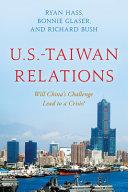

Most ebook files are in PDF format, so you can easily read them using various software such as Foxit Reader or directly on the Google Chrome browser.
Some ebook files are released by publishers in other formats such as .awz, .mobi, .epub, .fb2, etc. You may need to install specific software to read these formats on mobile/PC, such as Calibre.
Please read the tutorial at this link: https://ebookbell.com/faq
We offer FREE conversion to the popular formats you request; however, this may take some time. Therefore, right after payment, please email us, and we will try to provide the service as quickly as possible.
For some exceptional file formats or broken links (if any), please refrain from opening any disputes. Instead, email us first, and we will try to assist within a maximum of 6 hours.
EbookBell Team

4.7
46 reviewsAnxiety about China’s growing military capabilities to threaten Taiwan has induced alarm in Washington about whether the United States remains capable of deterring attempts to seize Taiwan by force. This alarm has fed American impulses to alter longstanding policy, and to increasingly view challenges confronting Taiwan through a military lens. While Taiwan clearly is under growing military threat, it also is facing a simultaneous and intensifying Chinese political campaign to wear down the will of the Taiwan people. This latter line of effort receives less attention, but left unaddressed, has the potential to do far more damage to American interests.
This book rightsizes the risks confronting Taiwan by taking a holistic view of China’s national ambitions and Taiwan’s role in them, China’s strategies for pursuing unification with Taiwan, and America’s most effective responses. Contrary to many other books on the market, the authors make the case for why conflict in the Taiwan Strait is not preordained, and in fact, it would be strategic folly for the United States to conclude that conflict is inescapable.
Hass, Bush, and Glaser argue that the center of gravity for determining the future of Taiwan is the will of Taiwan’s 23 million people. American policy should focus on their hopes and fears if the United States wishes to maintain influence over events in the Taiwan Strait. This calls for American resoluteness and steadiness of purpose in fortifying Taiwan’s economic dynamism, political autonomy, military preparedness, and dignity and respect on the world stage. Maintaining credible military deterrence is the minimum threshold, not the measure of success. U.S.-Taiwan Relations will be an invaluable resource for students, researchers, and journalists to understand this critical moment in U.S. foreign policy.